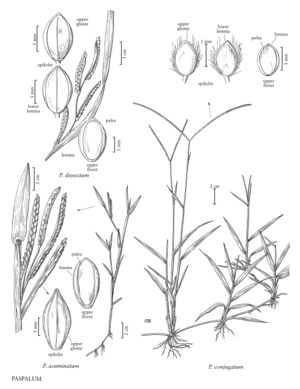Difference between revisions of "Paspalum acuminatum"
FNA>Volume Importer |
imported>Volume Importer |
||
| (5 intermediate revisions by 2 users not shown) | |||
| Line 26: | Line 26: | ||
-->{{#Taxon: | -->{{#Taxon: | ||
name=Paspalum acuminatum | name=Paspalum acuminatum | ||
| − | |||
|authority=Raddi | |authority=Raddi | ||
|rank=species | |rank=species | ||
| Line 33: | Line 32: | ||
|basionyms= | |basionyms= | ||
|family=Poaceae | |family=Poaceae | ||
| + | |illustrator=Linda A. Vorobik;Cindy Roché | ||
| + | |illustration copyright=Utah State University | ||
|distribution=Ga.;Tex.;La.;Ala.;Miss.;Fla. | |distribution=Ga.;Tex.;La.;Ala.;Miss.;Fla. | ||
|reference=None | |reference=None | ||
| Line 38: | Line 39: | ||
|publication year= | |publication year= | ||
|special status= | |special status= | ||
| − | |source xml=https:// | + | |source xml=https://bitbucket.org/aafc-mbb/fna-data-curation/src/200273ad09963decb8fc72550212de541d86569d/coarse_grained_fna_xml/V25/V25_1446.xml |
|subfamily=Poaceae subfam. Panicoideae | |subfamily=Poaceae subfam. Panicoideae | ||
|tribe=Poaceae tribe Paniceae | |tribe=Poaceae tribe Paniceae | ||
Latest revision as of 17:57, 11 May 2021
Plants perennial; rhizomatous. Culms 30-100 cm, strongly decumbent, upright portion usually not standing more than 20 cm tall, much branched; nodes glabrous. Sheaths glabrous; ligules 1-2.4 mm; blades to 7 cm long, 3-6.5 mm wide, flat. Panicles terminal, with 2-5 racemosely arranged branches; branches 2-6 cm, diverging, persistent; branch axes 2-3.3 mm wide, broadly winged, glabrous, margins scabrous, terminating in a spikelet. Spikelets 3.2-4 mm long, 1.6-1.7 mm wide, solitary, appressed to the branch axes, elliptic, abruptly pointed, stramineous. Lower glumes absent; upper glumes and lower lemmas glabrous, 5-veined; upper florets stramineous, lemmas with a few minute hairs at the apices. Caryopses 2-3 mm, white. 2n = 40.
Distribution
Ga., Tex., La., Ala., Miss., Fla.
Discussion
Paspalum acuminatum grows at the edges of lakes, ponds, rice fields, and wet roadside ditches. It is native to the Americas, with a range that extends from the southern United States to Argentina.
Selected References
None.
